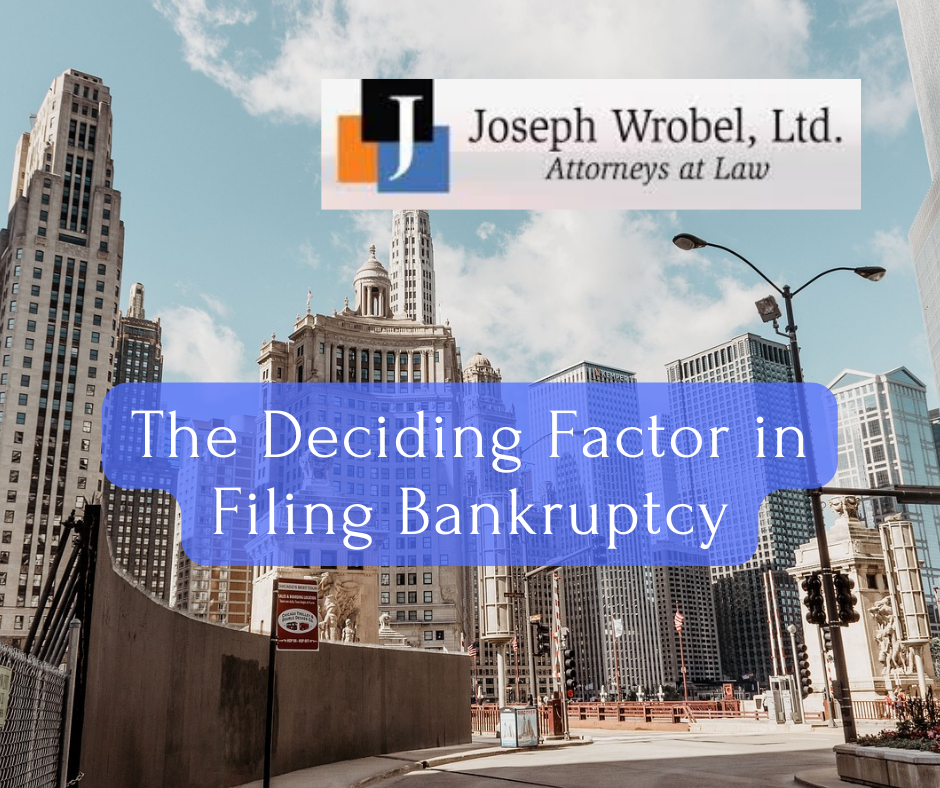Chicago Bankruptcy Lawyer Joseph Wrobel Identifies the Deciding Factor in Filing Bankruptcy
In times of financial hardship, individuals and businesses may face overwhelming debt that becomes difficult to manage. Filing for bankruptcy can be a critical decision that offers relief from debt and provides a fresh start. However, it is crucial to understand the deciding factors that play a pivotal role in determining whether bankruptcy is the right option. In this guide, we will explore the key factors to consider when contemplating bankruptcy, empowering you to make an informed decision about your financial future.
In Chicago, people trust bankruptcy lawyer, Joseph Wrobel, to tell them their rights and options when something happens that becomes the deciding factor in filing bankruptcy. It could be a foreclosure on a home, a wage garnishment, or a lawsuit that causes people to take advantage of their bankruptcy rights.
Evaluating the Financial Situation
Before considering bankruptcy, it is essential to evaluate your financial situation thoroughly. Analyze your total debt, including credit card balances, medical bills, mortgages, car loans, and other outstanding liabilities. Compare your debt to your income and assess whether you can feasibly repay your debts within a reasonable time frame. If you find yourself drowning in debt and unable to make regular payments, bankruptcy may be a viable solution.
About Our Firm: Joseph Wrobel, Limited
Type of Bankruptcy
Two primary types of bankruptcy are available to individuals and businesses: Chapter 7 and Chapter 13. Each option serves different purposes and has specific eligibility criteria.
– Chapter 7 Bankruptcy: Also known as “liquidation bankruptcy,” Chapter 7 involves selling non-exempt assets to repay creditors. It suits individuals or businesses with limited income and substantial unsecured debts. Certain assets, such as a primary residence or essential personal belongings, may be protected from liquidation.
– Chapter 13 Bankruptcy: Referred to as “reorganization bankruptcy,” Chapter 13 allows individuals with a regular income to create a manageable repayment plan over three to five years. Debtors can retain their assets while making affordable payments to creditors.
Eligibility for Bankruptcy
Eligibility for bankruptcy depends on various factors, including the type of bankruptcy you want to file and your financial status. In the United States, individuals must pass the “means test” to qualify for Chapter 7 bankruptcy. This test compares your income to the median income in your state and determines whether you have enough disposable income to repay your debts partially.
Impact on Credit Score
Filing for bankruptcy can have a significant impact on your credit score. A bankruptcy filing will remain on your credit report for several years, challenging to obtain new credit or loans. However, your credit score may be compromised if you are struggling to meet your debt obligations. Bankruptcy can be the first step towards rebuilding your credit over time.
Protection from Creditors
One of the critical benefits of bankruptcy is the automatic stay, which provides immediate protection from creditor harassment, collection efforts, and wage garnishments. This legal injunction prevents creditors from contacting you or taking legal action against you during bankruptcy.
Dischargeable Debts
Understanding which debts can be discharged or forgiven through bankruptcy is vital. In Chapter 7, bankruptcy, unsecured debts like credit card bills, medical bills, and personal loans are generally dischargeable. However, certain obligations, such as student loans, child support, and tax debts, are usually non-dischargeable. Chapter 13 bankruptcy allows for the discharge of a broader range of debts once the repayment plan is completed.
Non-Dischargeable Debts
Certain debts are considered non-dischargeable in both Chapter 7 and Chapter 13 bankruptcies. These debts must be repaid even after the bankruptcy process is complete. Common examples of non-dischargeable debts include tax debts, alimony, child support, student loans (in most cases), and specific court fines.
Our Blog Explains: What Are The Differences Between Chapter 7 and Chapter 13 Bankruptcy?
Protection of Assets
Many people fear losing their assets when filing for bankruptcy. However, both Chapter 7 and Chapter 13 bankruptcy provide mechanisms to protect certain assets from liquidation. Exemption laws vary from state to state, but common exempt assets include a primary residence, necessary clothing, household goods, retirement accounts, and tools used for work.
Legal Representation
Navigating the bankruptcy process can be complex and overwhelming, and seeking the assistance of a qualified bankruptcy attorney is highly recommended. An experienced attorney can guide you through the process, ensure you meet all legal requirements, and maximize the protection of your assets.
Conclusion
Joseph Wrobel, Limited is a Chicago bankruptcy law firm designed to put you in the driver’s seat to determine if taking advantage of the bankruptcy laws makes sense to give you a fresh financial start.
Filing for bankruptcy is a significant decision that can have long-lasting implications on your financial future. You can make an informed choice by evaluating your financial situation, understanding the different types of bankruptcy, and seeking the guidance of a bankruptcy attorney. Remember that bankruptcy is a tool designed to provide relief to those facing insurmountable debt and offer a fresh start to rebuild financial stability. Whether it’s Chapter 7 or Chapter 13, the decision to file for bankruptcy should be made after careful consideration and a thorough understanding of the process.

 Subscribe to CB on YouTube!
Subscribe to CB on YouTube!